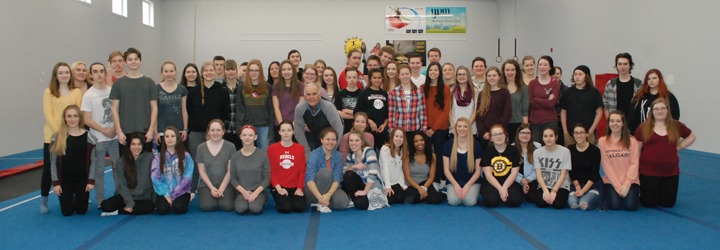Current Temperature
Myers students part of cultural exchange
Posted on March 9, 2016 by Taber Times Times photo by Nikki Jamieson
Times photo by Nikki JamiesonBy Nikki Jamieson
Taber Times
njamieson@tabertimes.com
When you think of exchange trips, you tend to think about student going off to study in far-off places like France, but not staying within their country’s borders.
But that is exactly what 30 Grade 11 W.R. Myers High School students did last month. They hosted 30 École Secondaire Du Mont-Bruno students from Montreal during the week of Feb. 8 and then the following week, they got to experience life in Montreal, through a federal government sponsored program, Experiences Canada.
“I think any opportunity, where students get to go somewhere else and learn and explore and use some of the tools they gained in school, is such an amazing opportunity,” said Megan Leusink, a teacher at W.R. Myers and trip organizer. “When you have 30 kids who are from Montreal, a big city, who came here and wanted to stay here, it showed our kids that growing up in a small town is a unique experience, a great experience.”
Leusink had originally applied to the program the previous school year, keeping it quiet except for giving administration a heads up. While she didn’t get in last year, she did get a call saying that this year, she got matched up with another school.
“I didn’t know if we’ll actually get matched,” said Leusink. “I found out in September, of this school year, that we were matched with a group from Montreal.”
Experiences Canada is a federal-run Canadian exchange student program that allows two groups of students from different parts of Canada to experience each other’s culture. They will take turns hosting each other for seven to 10 days each, including two days for travel. Each group must have a minimum of 10 students from a school or otherwise recognize community organization and are 12-17 years old.
Travel costs are taken care of by the department of Canadian Heritage, although the individual groups must cover the costs of activities, which was roughly $400 for each student.
“They actually paid for our travel expenses, so it was something that I really wanted to take advantage of, since not every child has the financial means to travel and have these life experiences.”
While the Montreal students were in Taber, all 60 students did activities such as a nature walk, a Great Escape adventure, bowling, visiting the gymnastic centre, made crafts with a local first nations representative and visited a local dairy farm.
“Lots of the kids from Montreal, it may seem kind of silly, but lots of them have never really seen a cow before,” said Leusink. “Which is kind of hard to believe for us here…True city kids.”
That trip highlighted just one of the many differences between the many. Besides the preferred language, the differences between Taber and Montreal extend through to pasttimes, food and climate, something which can be easily overlooked despite the nearly 2,900 kilometres between the two places.
“It’s different. It’s really, really different. It’s like, there’s a part that’s all mountains and rocks everywhere, and there’s this other part that’s plain, nothing, just nothing. In Quebec it’s all mountains and trees everywhere,” said Freddrique Martin, a Grade 5 student (or Grade 11 in Alberta) from Montreal. “Spending time with people that I don’t know, talking English helps me learn, and just having fun with them, spending time with them. I decided to come because I wanted to perfect my English, and because I wanted to meet new people, and discover a new side of Canada.”
While in Montreal, the students saw a film in French, saw a view of the city at Chalet du Mont Royal, ate authentic poutine, toured old Montreal, went snow tubing and saw the Montreal Canadiens.
“(On the Friday) We went skating in the morning,” said Leusink. “And after we were done skating, the Montreal Canadiens were there and they had a practice, so we got to see the Montreal Canadiens practice.”
Experiences Canada has been operating since 1936, first as Visites Interprovinciales and then SEVEC in 1981 until they changed the name again this year. The program has served over 350,000 youth during the 80 years since it’s inception.
“It gives the opportunity for the youth in our communities to learn about our country. They learn from their peers, and, trust me, they learn more from their peers about their country then any other way, which makes it a real learning (experience), in the sense of they understand each other and they learn to accept those things because of their peers,” said Bow River MP Martin Shields. “Students choosing to do that, and teachers who help get students involved with that, I think is fantastic.”
Leave a Reply
You must be logged in to post a comment.



